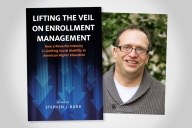You have /5 articles left.
Sign up for a free account or log in.
Rick Singer, who masterminded the Varsity Blues admissions scams, was sentenced last week to three and a half years in prison for his role in the scandal. U.S. District Judge Rya W. Zobel ordered Singer to pay $10 million in restitution to the federal government.
In March 2019, Singer pleaded guilty to conspiracy to commit racketeering, conspiracy to commit money laundering, obstruction of justice and conspiracy to defraud the United States. But he was not sentenced then because he was cooperating with prosecutors in the case. He tried to get students into highly competitive colleges in return for bribes through a fake foundation. In many cases the students posed as athletes, which made it easier for them to be admitted. In other cases, the bribes were paid to corrupt proctors to change answers on the students’ SAT or ACT tests. The actors Lori Loughlin and Felicity Huffman were the most famous of the people who participated.
“Singer was the architect of a massive, decade-long scheme to use fraud and bribery to secure the admission of high school students to elite colleges and universities across the country,” said a federal brief on Singer. “The unraveling of that scheme as part of the government’s Operation Varsity Blues ultimately led to the conviction of more than 50 parents, coaches, and Singer associates.”
What the Government Said
The federal prosecutors in the case had recommended a six-year jail sentence and a fine of more than $10 million.
The brief filed noted that Singer had cooperated (in part) with the prosecution.
“While Singer agreed to cooperate with the government’s investigation upon being approached by law enforcement agents, he did so reluctantly,” said the brief. “He initially minimized his criminal conduct and failed to be completely truthful. During the early period of his cooperation, he not only obstructed the investigation by tipping off at least six of his clients … but also failed to follow the government’s instructions in other ways, including by deleting text messages and using an unauthorized cell phone.”
Still, the government brief said that “Singer’s cooperation was also hugely significant”—he “agreed to a consensual wiretap of his phone that lasted several months, during which time he made hundreds of recorded calls at the government’s direction with dozens of targets of the investigation. He also wore a wire to record several targets in person. Although he did not consistently follow the government’s instructions in making them, the recordings permitted the government to prosecute dozens of parents and other co-conspirators who otherwise would have escaped charges because of the historical nature of their conduct and the difficulty of proving their criminal intent in the absence of recorded admissions.”
The brief continued, “The information Singer provided allowed the government to obtain search warrants for the email accounts of many parents and other co-conspirators, which resulted in the seizure of crucial evidence of their knowing and willful participation in the scheme. While it is difficult to attribute any specific plea to Singer, his decision to cooperate, and the evidence obtained as a result of his cooperation, unquestionably led to the guilty pleas of many parents, coaches, and other participants in the scheme.”
The government said Singer deserved “a meaningful sentence of incarceration that significantly exceeds those imposed on all other defendants sentenced in the Varsity Blues cases.” (One sentence was 30 months, but most were far shorter.)
“Singer conceived and created the nationwide network of corrupt test proctors and administrators and college athletic coaches and administrators who helped implement his scheme and allowed it to succeed on the unprecedented scale that it did. His clients are certainly not the first to have cheated on college entrance exams, or to have paid corrupt coaches to give up recruitment slots, but Singer developed a massive criminal enterprise purpose-built to execute such fraud on an industrial scale. And he created a market for his fraud, promoting the scheme to parents who—while eager and willing participants in the crime—would otherwise not have engaged in it on their own,” the brief said. “He found demand in his wealthy and overprivileged clients, and helped to stoke it by convincing them that their children would not be admitted to the college of their choice without using his illicit services.”
In addition, the government said, it was important for Singer to do real time behind bars to send a message.
“A significant sentence of imprisonment is necessary not only to reflect the nature and seriousness of Singer’s offense and his degree of culpability as compared to other Varsity Blues defendants, but also for purposes of general deterrence,” said the brief. “As the Varsity Blues cases have made clear, it was all too easy for Singer to corrupt the nation’s college admissions process—on a massive scale for over a decade—by paying off those who were supposed to serve as gatekeepers and stewards of higher education in this country. It is difficult for universities, and criminal authorities, to detect and prevent such fraud. While Operation Varsity Blues has caused universities across the country to institute unprecedented reforms aimed at curtailing the abuses that occurred here, there is ultimately no surefire way to safeguard against criminal ingenuity. Loopholes and those willing to exploit them for money will remain. Singer’s sentence should serve as a warning to anyone who might consider picking up where he left off.”
Singer’s Counterargument
Singer’s lawyers asked Judge Zobel to keep Singer out of prison and punish him with a year of house arrest, three years of probation and 750 hours of community service.
“For the rest of my life,” Singer wrote in a letter to the judge, “I have no expectation or desire to have the lifestyle I had when I was caught.”
Six Months for Ex-USC Official
Donna Heinel, former senior associate athletic director at the University of Southern California, was sentenced last week for using her position to facilitate students’ admission as purported athletic recruits in exchange for money.
U.S. District Court Judge Indira Talwani imposed a sentence of six months in prison and two years of supervised release.
Beginning in 2014, Heinel solicited and received bribe payments from Varsity Blues mastermind Rick Singer and his clients to facilitate their children’s admission to USC as athletic recruits. For approximately four years, Heinel misled USC’s athletic admissions subcommittee by presenting the students as recruits to USC’s athletic teams when, in reality, the coaches had not recruited them and some did not even play the sport they were purportedly being recruited to play. In some cases, Heinel falsified students’ athletic credentials when presenting them to the athletic admissions subcommittee. In exchange, Heinel received more than $1 million in payments from Singer and his clients to university accounts she oversaw.
In addition, Heinel received $160,000 in payments for her own personal benefit. In total, the subcommittee on athletic admissions approved the admission of approximately two dozen applicants Heinel presented as purported recruits.








